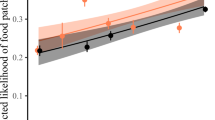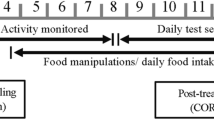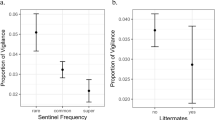Abstract
When animals have to decide where to forage, what to eat or with whom to mate, they can base their decisions on either socially or personally acquired information. In accordance with theoretical predictions, there is experimental evidence that animals adjust the weight they give to both sources of information depending on circumstances. Notably, several studies have demonstrated that individuals rely more on social information when personal information is difficult to acquire or unreliable, because these conditions leave them uncertain as how to behave. Yet, even when individuals are exposed to the same conditions, they generally differ widely in the value they attribute to social and personal information. These differences suggest that the tendency to rely on social information would also depend on intrinsic characteristics that affect, for instance, individual efficiency in collecting personal information. To address this issue, we conducted laboratory experiments using female zebra finches (Taeniopygia guttata) and we tested them under three consecutive conditions. First, we evaluated their reliance on social information in a mating context and in a foraging context. Then, we measured their efficiency in acquiring personal information by recording their sampling behaviour when searching for hidden food. We found that females that sampled their environment less actively consistently relied on social information to a greater extent compared with those that invested more in sampling. Contrary to what is generally assumed, then, our study demonstrates that social information use is not entirely flexible and context dependent.




Similar content being viewed by others
References
Benskin CMWH, Mann NI, Lachlan RF, Slater PJB (2002) Social learning directs feeding preferences in the zebra finch, Taeniopygia guttata. Anim Behav 64:823–828
Boyd R, Richerson PJ (1985) Culture and the evolutionary process. University of Chicago Press, Chicago
Boyd R, Richerson PJ (1988) An evolutionary model of social learning: the effects of spatial and temporal variation. In: Zentall TR, Galef GB Jr (eds) Social learning: psychological and biological perspectives. Lawrence Erlbaum Associates, Hillsdale, pp 29–48
Coolen I, Dangles O, Casas J (2005) Social learning in noncolonial insects? Curr Biol 15:1931–1935
Cotton S, Small J, Pomiankowski A (2006) Sexual selection and condition-dependent mate preferences. Curr Biol 16:R755–R765
Danchin E, Giraldeau L-A, Valone TJ, Wagner RH (2004) Public information: from nosy neighbors to cultural evolution. Science 305:487–491
Drullion D, Dubois F (2008) Mate-choice copying by female zebra finches, Taeniopygia guttata: what happens when model females provide inconsistent information? Behav Ecol Sociobiol 63:269–276
Dubois F, Drullion D, Witte K (2012) Social information use may lead to maladaptive decisions: a game-theoretic model. Behav Ecol 23:225–231
Dugatkin LA, Godin JGJ (1993) Female mate copying in the guppy (Poecilia reticulata): age-dependent effects. Behav Ecol 4:289–292
Feldman MW, Aoki K, Kumm J (1996) Individual versus social learning: evolutionary analysis in a fluctuating environment. Anthropol Sci 104:209–232
Galef BG (2009) Strategies for social learning: testing predictions from formal theory. Adv Stud Behav 39:117–151
Galef BG, Laland KN (2005) Social learning in animals: empirical studies and theoretical models. Bioscience 55:489–499
Galef BG Jr, Dudley KE, Whiskin EE (2008) Social learning of food preferences in ‘disatisfied’ and ‘uncertain’ Norway rats. Anim Behav 75:631–637
Giraldeau L-A, Valone TJ, Templeton JJ (2002) Potential disadvantages of using socially acquired information. Philos T R Soc B 357:1559–1566
Harcourt JL, Biau S, Johnstone R, Manica A (2010) Boldness and information use in three-spined sticklebacks. Ethol 116:440–447
Herborn KA, Maclead R, Miles WTS, Schofield ANB, Alexander A, Arnold KE (2010) Personality in captivity reflects personality in the wild. Anim Behav 79:835–843
Kendal RL, Coolen I, Laland KN (2004) The role of conformity in foraging when personal and social information conflict. Behav Ecol 15:269–277
Kendal RL, Coolen I, van Bergen Y, Laland KN (2005) Trade-offs in the adaptive use of social and asocial learning. Adv Stud Behav 55:333–379
Kurvers RHJM, van Oers K, Nolet BA, Jonker RM, van Wieren SE, Prins HHT, Ydenberg RC (2010) Personality predicts the use of social information. Ecol Lett 13:829–837
Laland KN (2004) Social learning strategies. Learn Behav 32:4–14
Marchetti C, Drent PJ (2000) Individual differences in the use of social information in foraging by captive great tits. Anim Behav 60:131–140
Nomakuchi S, Park PJ, Bell MA (2009) Correlation between exploration activity and use of social information in three-spined sticklebacks. Behav Ecol 20:340–345
Rieucau G, Giraldeau L-A (2011) Exploring the costs and benefits of social information use: an appraisal of current experimental evidence. Philos T R Soc B 366:949–957
Rockwell C, Gabriel PO, Black JM (2012) Bolder, older, and selective: factors of individual-specific foraging behaviours in Steller’s jays. Behav Ecol 23:676–683
Stöhr S (1998) Evolution of mate-choice copying: a dynamic model. Anim Behav 55:893–903
Swaddle JP, Cathey MG, Correll M, Hodkinson BP (2005) Socially transmitted mate preferences in a monogamous bird: a non-genetic mechanism of sexual selection. Proc R Soc Lond B 272:1053–1058
Valone TJ (2007) From eavesdropping on performance to copying the behaviour of others: a review of public information use. Behav Ecol Sociobiol 62:1–14
Vukomanovic J, Rodd H (2007) Size-dependent female mate copying in the guppy (Poecilia reticulate): large females are role models but small one are not. Ethol 113:579–586
Wakano JY, Aoki K, Feldman MW (2004) Evolution of social learning: a mathematical analysis. Theor Popul Biol 66:249–258
Ward A, Thomas P, Hart P, Krause J (2004) Correlated of boldness in three-spined stickelbacks (Gasterosteus aculeatus). Behav Ecol Sociobiol 55:561–568
Webster MM, Laland KN (2011) Reproductive state affects reliance on public information in sticklebacks. Proc R Soc Lond B 278:619–627
Wilson ADM, Godin J-GJ (2009) Boldness and behavioural syndromes in the bluegill sunfish, Lepomis macrochirus. Behav Ecol 20:231–237
Witte K, Nöbel S (2011) Learning and Mate Choice. In: Brown C, Laland K, Krause J (eds) Fish cognition and behavior, 2nd edn. Blackwell Publishing, Oxford, pp 85–107
Woodgate JL, Bennett ATD, Leitner S, Catchpole CK, Buchanan KL (2010) Developmental stress and female mate choice behaviour in the zebra finch. Anim Behav 79:1381–1390
Acknowledgements
During this study, P. Rosa was supported by a research grant awarded to F. Dubois by the Natural Sciences and Engineering Research Council of Canada.
Ethical standards
The experiments described in this study were approved by the Animal Care Committee of the Université de Montréal (animal care permit #10-064) and conformed to all guidelines of the Canadian Council on Animal Care.
Conflict of interest
The authors declare that they have no conflict of interest
Author information
Authors and Affiliations
Corresponding author
Additional information
Communicated by S. Pruett-Jones
Rights and permissions
About this article
Cite this article
Rosa, P., Nguyen, V. & Dubois, F. Individual differences in sampling behaviour predict social information use in zebra finches. Behav Ecol Sociobiol 66, 1259–1265 (2012). https://doi.org/10.1007/s00265-012-1379-3
Received:
Revised:
Accepted:
Published:
Issue Date:
DOI: https://doi.org/10.1007/s00265-012-1379-3




